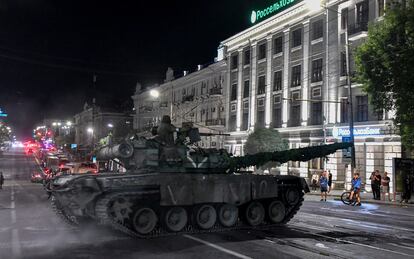US intelligence suspected Wagner chief of planning revolt against Moscow
Washington’s greatest concern in the face of a possible rebellion led by Prigozhin centered on control of Russia’s nuclear arsenal

U.S. intelligence agencies suspected the head of the mercenary Wagner Group, Yevgeny Prigozhin, was planning an armed rebellion against the Russian government, according to various U.S. media, which cited anonymous sources. The information was shared not only with military and government officials but also with some lawmakers, according to these sources.
U.S. President Joe Biden has been closely following the rebellion since Friday. He is staying informed from Camp David, in Maryland, where he is spending the weekend, and has been in contact with U.S. allies.
CNN revealed that, earlier last week, U.S. intelligence services briefed the leaders of Congress — known as the Gang of Eight — about the movements of the Wagner Group and the build-up of material near Russia. Members of U.S. and Western intelligence services saw signs that Prigozhin was preparing for a revolt, such as the stockpiling of weapons and ammunition. The information was confirmed later by other means.
According to The Washington Post, the intelligence services collected information in mid-June indicating that Prigozhin was planning an armed attack against the Russian defense establishment and urgently informed the White House and other government agencies so that it would not would catch them off guard.
U.S. intelligence services did not have precise information about Prigozhin’s concrete plans or when a rebellion could take place. On Friday, Wagner’s forces took control of a Russian city and on Saturday, they began to move towards Moscow. However, U.S. intelligence was aware of both the discontent and instability of the mercenary group.
According to The New York Times, intelligence officials informed senior military and administration officials on Wednesday that Prigozhin was preparing a military action against senior Russian defense officials.
Unlike last year, when Washington chose to make public the information that the secret service had collected on Russian aggression in a bid to prevent it the invasion of Ukraine, this time they shared what had been found with a restricted circle. This decision was taken to avoid being accused of orchestrating a coup in Russia and because the government had little interest in helping Putin avoid the crisis, according to The New York Times.
The newspaper reports that during the last two weeks there has been “great concern” about what could happen in Russia, and in particular about what instability could mean for the control of Russia’s nuclear arsenal.
In recent months, the intelligence services have been analyzing the growing tension between the Prigozhin and the leaders of the Russian Defense Ministry, in particular Defense Minister Sergei Shoigu. Problems adequately supplying Russian troops added to that tension.
A key trigger for the crisis was a June 10 Russian Defense Ministry order that meant all volunteer detachments would have to sign government contracts. Although the order did not mention the Wagner Group by name, it did involve the absorption and subordination of Prigozhin’s mercenary troops, which have proven essential to Russia’s military campaign in Ukraine and have helped secure some of its most notable tactical victories.
After seizing official buildings in the southern city of Rostov-on-Don — which borders Ukraine and is an important logistical hub for the Kremlin’s war effort — and launching a column of armored vehicles towards Moscow, Prigozhin announced Saturday evening that he was halting the march towards the capital and that his soldiers would retreat to their camps “to avoid bloodshed.”
U.S. President Joe Biden spoke Saturday with French President Emmanuel Macron, German Chancellor Olaf Scholz and the U.K. Prime Minister Rishi Sunak, about the situation in Russia. The group also affirmed their “unwavering support” for Ukraine. Secretary of State Antony Blinken and Secretary of Defense Lloyd Austin made similar calls to their counterparts from allied countries.
In a statement, the Pentagon said that the United States will remain in close coordination with its allies and partners as the situation continues to evolve. Biden has avoided making any statement and is following events from Camp David.
The national security team informed Biden and Vice President Kamala Harris of the situation on Saturday before the president left the White House. The meeting was attended by the National Security Adviser Jake Sullivan; Secretary of State Antony Blinken; Defense Secretary Lloyd Austin; the Chairman of the Joint Chiefs of Staff, Mark Milley; Director of National Intelligence Avril Haines; the head of the Central Intelligence Agency (CIA), William Burns, and the United States ambassador to the United Nations, Linda Thomas-Greenfield.
Sign up for our weekly newsletter to get more English-language news coverage from EL PAÍS USA Edition
Tu suscripción se está usando en otro dispositivo
¿Quieres añadir otro usuario a tu suscripción?
Si continúas leyendo en este dispositivo, no se podrá leer en el otro.
FlechaTu suscripción se está usando en otro dispositivo y solo puedes acceder a EL PAÍS desde un dispositivo a la vez.
Si quieres compartir tu cuenta, cambia tu suscripción a la modalidad Premium, así podrás añadir otro usuario. Cada uno accederá con su propia cuenta de email, lo que os permitirá personalizar vuestra experiencia en EL PAÍS.
¿Tienes una suscripción de empresa? Accede aquí para contratar más cuentas.
En el caso de no saber quién está usando tu cuenta, te recomendamos cambiar tu contraseña aquí.
Si decides continuar compartiendo tu cuenta, este mensaje se mostrará en tu dispositivo y en el de la otra persona que está usando tu cuenta de forma indefinida, afectando a tu experiencia de lectura. Puedes consultar aquí los términos y condiciones de la suscripción digital.









































